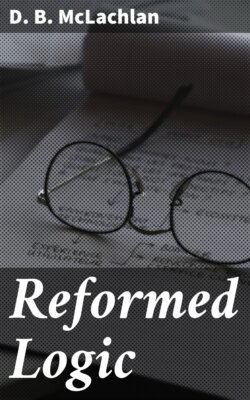Читать книгу Reformed Logic - D. B. Mclachlan - Страница 9
На сайте Литреса книга снята с продажи.
IV—ITS ORIGIN AND FUNCTION
ОглавлениеTable of Contents
The mind has at physical birth one uniform quality of plasma and consciousness. By education and experience a portion of the plasma is gradually changed, and the consciousness excited by this portion is what we call Intellect. The word may also stand for the plasma so differentiated.
The consciousness pertaining to the plasma left in its primitive state is Sentiment, which generally corresponds to what is termed the moral nature of man.
Intellect is a temporary condition arising out of the need to preserve the Self from hostile and inharmonious surroundings. The adaptation is artificial, and may therefore be well-done, or ill-done, or over-done. It is over-done when too much of the plasma and mental energy is devoted to intellectual purposes—when the individual has, to use a common expression, more head than heart. In this case the end is sacrificed to the means.
I conceive the intellect as a hardening of the plasma in its superficies, the formation of a sort of rind capable of receiving finer, sharper, and more enduring impressions than the plasma of sentiment; and, being harder, it is better able than the latter to resist enfeebling influences. Its duty is to challenge and inspect vibrations before permitting them to pass inwards to the region of sentiment. Yet the intellectual consciousness is itself a degree of sentiment, and in intellects not sufficiently trained it may be impossible to distinguish thoughts that are purely intellectual, from thoughts that are also to some extent sentimental. Upon minds of this sort the best-prepared arguments have no hold; they must be mixed with oratory and poetry to receive any attention. It need not be said that a mind which responds only to 'persuasive' language is feeble of intellect. It lives in the present only, and is incapable of far-reaching designs. It is to the intellect we owe the power of conceiving the past and future, and of laying plans for the future.
A mind properly intellectualised is, of its kind, strong and self-controlled. With the intellect defective the man exhibits passion, undue excitement and demonstrativeness. He responds to the least stimulus, like an exposed nerve; his energy is wasted in explosions. Sentiment is the inmost nerve of man—intellect its protecting sheath. The most carefully trained intellect is liable at times to be carried by assault or stratagem; then follows a feeling of emptiness occasioned by loss of energy. On the other hand an appearance of self-command may be really due to apathy,—the mind is of a low type and callous to influences that usually affect its species. If it is bad to be explosive, it is perhaps worse to be incapable of exploding.
Intellect is not the supreme or ruling intelligence of man. It initiates nothing. It is a light to direct our steps, but we do not walk where the light happens to fall—we make it fall where we desire to walk. Hence the diversity of occupation and intellectual accomplishments in men. Each acquires the sort of intellect he thinks will be sentimentally most serviceable to him; and on matters concerning which he has not learnt to reason he consults other men. We are not born rational beings; we are in no sense rational on all subjects; we are rational only on those few which we have mastered.
Men pretend to act from reason only, and perhaps they do on matters to which they are indifferent. But in general their rationality consists in finding pretexts for what on sentimental grounds they have already resolved to do, and in finding ways and means to carry out their resolves. Sentiment is the moving spring of conduct: intellect is the executive faculty. Those historical philosophers are mistaken who suppose the progress of mankind results from intellectual discoveries and inventions. These are effects, not causes, of progress—effects of sentimental disagreement with previous conditions.
Intellect is little more than an extension inwards of our senses. It is an epitome and rearrangement of their observations, and is as instrumental as they. We are not necessarily improved by a development of the intellect forced upon us from without. Education is sometimes a dagger put into the hands of an assassin. The best education is largely sentimental (moral), for that is not confined to preserving the mind we have—it gives us another and a better mind, and so indirectly improves the intellect.
